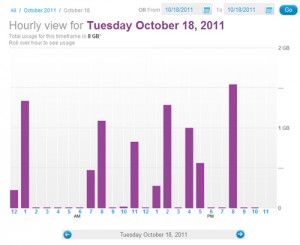
Phillip "Keeping an Eye on Time Warner's Eye" Dampier
Today’s announcement by Time Warner Cable that it is reintroducing usage based billing, at least optionally for customers in southern Texas, is a concerning development that requires further examination and vigilance. But before we delve into that, I’d like to thank the company for avoiding the kind of mandatory usage billing/cap system we’ve seen appearing at certain other providers. We also welcome the company’s admission that they have earned enormous profits from unlimited consumption plans and consider that pricing part of the success story they’ve had selling Internet access.
Stop the Cap! has never opposed optional usage-based billing tiers for customers who feel their light usage justifies a service discount. However, industry trends so far have made no provisions for truly unlimited usage plans that sit side by side tiered plans without quietly diluting the value of flat rate Internet with tricks and traps in the fine print. We have serious concerns this “foot in the door” to Internet Overcharging could eventually become mandatory for all customers. Perhaps Time Warner Cable will be different than all the rest. We can only hope so.
Let’s break it down:
First, Time Warner Cable’s admission it blew it the first time it experimented with these pricing schemes is most welcome. Being on the front lines of the battle against the company’s Internet Overcharging experiment in 2009 remains very-well-documented on this website. We confronted arrogant local management that argued usage billing was “fair” and would barely affect any customer. In fact, the original plan a later revision would have tripled flat rate Internet access to a ridiculous $150 a month.
The company’s 2009 “listening tour” was also a farce, with a number of e-mailed comments deleted unread (we know, because Time Warner’s comment system sent e-mail to customers telling them exactly that.) Local media outlets, newspaper editorials, and customers made it quite clear: customers want their unlimited Internet access left alone. They do not want to learn the mysteries of a gigabyte, they don’t want to watch a gauge to determine how much usage they have left, and they sure don’t want to pay any more for broadband service.
If Jeff Simmermon, Time Warner Cable’s director of digital communications, now represents the prevailing attitude about unlimited Internet access among Time Warner Cable’s executive management, that is a very welcome change indeed. But we’re not completely convinced. For nearly two years, Time Warner executives have talked favorably about usage-based billing as the “fairest way” to bill for Internet usage. Besides Simmermon’s comments, we have seen nothing from CEO Glenn Britt or CFO Irene Esteves that indicates they have changed their original views on that.
Unfortunately, we’ve learned over the last three years today’s promises may not mean a lot a year from now. We’ve watched too many companies introduce these pricing schemes and then gradually tighten the noose around their customers. Once broadband usage is monetized, Wall Street looks to the practice of charging for usage as a revenue source, and they pressure companies to keep that money flowing. What begins as an optional tiered plan can eventually become the only plan when flat rate broadband is “phased out.”
 Canadians understand this is not unprecedented. They’ve been down this broadband road before, and it is loaded with expensive potholes and broken promises to repair them. Usage allowances have actually dropped at some Canadian providers. The fixed maximum on overlimit fees has gradually been relaxed or removed altogether, exposing Canadian consumers to broadband bill shock.
Canadians understand this is not unprecedented. They’ve been down this broadband road before, and it is loaded with expensive potholes and broken promises to repair them. Usage allowances have actually dropped at some Canadian providers. The fixed maximum on overlimit fees has gradually been relaxed or removed altogether, exposing Canadian consumers to broadband bill shock.
Time Warner Cable customers are now paying upwards of $50 a month for broadband after consecutive annual rate increases. That’s plenty, and usage should remain unlimited for that kind of money.
Still, Stop the Cap! has never been opposed to truly optional usage-based billing plans. We’re just unconvinced companies will keep the wildly popular flat rate pricing if boatloads of additional revenue can be made dragging customers to tiered usage plans, particularly in the absence of aggressive competition. Just ask AT&T.
Second, as we’ve seen on the wireless side, “unlimited Internet access” means one thing to consumers and all-too-often something very different to providers. For example, companies have discovered they can claim to provide unlimited access but then de-prioritize flat rate traffic, or even worse, throttle speeds and give preferential treatment to usage-based billing traffic. Time Warner Cable needs to commit that unlimited access means exactly that — no traffic prioritization, no speed throttles, and no sneaky fine print.
Third, we don’t expect Time Warner will get too many takers for their Broadband Essentials Internet program. The discount, just $5 a month, is quite low for broadband service limited to 5GB per month. Exceeding that limit is quite easy, and after just 5GB of “excess usage,” the discount is eaten away and the penalty rate of $1/GB kicks in. That could ultimately risk up to $25 a month in extra charges. I’m uncertain how many customers would want to risk exposing themselves to that for a modest discount.
While we are not issuing a Call to Action over these developments, we will be watching them very closely. Time Warner Cable should make no mistake: if their usage billing plans begin to eat away at fairly priced unlimited access plans, we will once again picket the company and do whatever is necessary to bring political and consumer pressure to force them to rescind these kinds of pricing schemes yet again.
 Last fall, our regular reader Scott wrote us about recent rate increases Bright House Networks imposed on broadband-only customers: $50/month for Internet access. He learned from Stop the Cap! that a virtually identical, but lesser-known provider was ready and willing to provide six months of essentially equivalent Internet service for $20 less a month.
Last fall, our regular reader Scott wrote us about recent rate increases Bright House Networks imposed on broadband-only customers: $50/month for Internet access. He learned from Stop the Cap! that a virtually identical, but lesser-known provider was ready and willing to provide six months of essentially equivalent Internet service for $20 less a month.

 Subscribe
Subscribe







